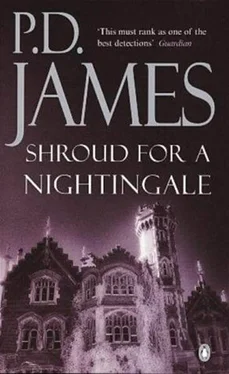P James - Shroud for a Nightingale
Здесь есть возможность читать онлайн «P James - Shroud for a Nightingale» весь текст электронной книги совершенно бесплатно (целиком полную версию без сокращений). В некоторых случаях можно слушать аудио, скачать через торрент в формате fb2 и присутствует краткое содержание. Жанр: Детектив, на английском языке. Описание произведения, (предисловие) а так же отзывы посетителей доступны на портале библиотеки ЛибКат.
- Название:Shroud for a Nightingale
- Автор:
- Жанр:
- Год:неизвестен
- ISBN:нет данных
- Рейтинг книги:3 / 5. Голосов: 1
-
Избранное:Добавить в избранное
- Отзывы:
-
Ваша оценка:
- 60
- 1
- 2
- 3
- 4
- 5
Shroud for a Nightingale: краткое содержание, описание и аннотация
Предлагаем к чтению аннотацию, описание, краткое содержание или предисловие (зависит от того, что написал сам автор книги «Shroud for a Nightingale»). Если вы не нашли необходимую информацию о книге — напишите в комментариях, мы постараемся отыскать её.
Shroud for a Nightingale — читать онлайн бесплатно полную книгу (весь текст) целиком
Ниже представлен текст книги, разбитый по страницам. Система сохранения места последней прочитанной страницы, позволяет с удобством читать онлайн бесплатно книгу «Shroud for a Nightingale», без необходимости каждый раз заново искать на чём Вы остановились. Поставьте закладку, и сможете в любой момент перейти на страницу, на которой закончили чтение.
Интервал:
Закладка:
He looked across meaningly at Sergeant Masterson.
“Not that I care whether it’s made public. But, after all, the girl is dead. We may as well try to protect her reputation.”
Dalgliesh found it difficult to believe that Mr. Courtney-Briggs was interested in anyone’s reputation but his own. But, gravely, he gave the necessary assurance. He saw the surgeon leave without regret. An egotistical bastard whom it was agreeable, if childish, to provoke. But a murderer? He had the hubris, the nerve and the egotism of a killer. More to the point, he had had the opportunity. And the motive? Hadn’t it been a little disingenuous of him to have confessed so readily to his relationship with Josephine Fallon? Admittedly he couldn’t have hoped to keep his secret for long; a hospital was hardly the most discreet of institutions. Had he been making a virtue of necessity, ensuring that Dalgliesh heard the version of the affair before the inevitable gossip reached his ears? Or had it been merely the candor of conceit, the sexual vanity of a man who wouldn’t trouble to conceal any exploit which proclaimed his attraction and virility?
Putting his papers together, Dalgliesh became aware that he was hungry. He had made an early start to the day and it bad been a long morning. It was time to turn his mind from Stephen Courtney-Briggs and for him and Masterson to think about luncheon.
Chapter Five
I
The resident Sisters and students from Nightingale House took only their breakfast and afternoon tea in the dining-room at the school. For their main midday and evening meal they joined the rest of the staff in the hospital cafeteria where all but the consultants ate in institutionalized and noisy proximity. The food was invariably nourishing, adequately cooked, and as varied as was compatible with the need to satisfy the differing tastes of several hundred people, avoid outraging their religious or dietary susceptibilities, and keep within the catering officer’s budget The principles governing the menu planning were invariable. Liver and kidneys were never served on days when the urinary surgeon operated, and the nurses were not faced with the same menu as that which they had just served to the patients.
The cafeteria system had been introduced at the John Carpendar hospital against strong opposition from all grades of staff. Eight years ago there had been separate dining-rooms for the Sisters and nurses, one for the administrative and lay professional staff, and a canteen for the porters and artisans. The arrangements had suited everyone as making a proper distinction between grades and ensuring that people are in reasonable quietness and in the company of those with whom they preferred to spend their lunch break. But now only the senior medical staff enjoyed the peace and privacy of their own dining-room. This privilege, jealously defended, was under perpetual attack from Ministry auditors, Government catering advisers and work study experts who, armed with costing statistics, had no difficulty in proving that the system was uneconomical but so far the doctors had won. Their strongest argument was their need to discuss the patients in privacy. This suggestion that they never stopped working, even for meals, was greeted with some skepticism but was difficult to refute. The need to keep the patients affairs confidential touched on that area of patient-doctor relationship which the doctors were always quick to exploit. Before this mystique even the Treasury auditors were powerless to prevail. Furthermore, they had had the support of Matron. Miss Taylor had made it known that she considered it eminently reasonable that the senior medical staff should continue to have their own dining-room. And Miss Taylor’s influence over the Chairman of the Hospital Management Committee was so obvious and of such long standing that it had almost ceased to excite comment. Sir Marcus Cohen was a wealthy and personable widower and the only surprise now was that he and Matron hadn’t married. This, it was generally accepted, was either because Sir Marcus, an acknowledged leader of the country’s Jewish community, chose not to marry outside his faith or because Miss Taylor, wedded to her vocation, chose not to marry at all.
But the extent of Miss Taylor’s influence over the Chairman and thus over the Hospital Management Committee was beyond speculation. It was known to be particularly irritating to Mr. Courtney-Briggs since it considerably diminished his own. But in the matter of the consultants’ dining-room it has been exercised in his favor and had proved decisive.
But if the rest of the staff had been forced into proximity they had not been forced into intimacy. The hierarchy was still apparent. The immense dining-room had been divided into smaller dining areas separated from each other by screens of lattice work and troughs of plants, and in each of these alcoves the atmosphere of a private dining-room was recreated.
Sister Rolfe helped herself to plaice and chips, carried her tray to the table which, for the past eight years, she had shared with Sister Brumfett and Sister Gearing, and looked around at the denizens of this strange world. In the alcove nearest the door were the laboratory technicians in their stained overalls, noisily animated. Next to them was old Fleming, the outpatient pharmacist, rolling bread pellets like pills in his nicotine-stained fingers. At the next table were four of the medical stenographers in their blue working overalls. Miss Wright, the senior secretary, who had been at the John Carpendar for twenty years, was eating with furtive speed as she always did, avid to get back to her typewriter. Behind the adjacent screen was a little clutch of the lay professional staff -Miss Bunyon the head radiographer, Mrs. Nethern, the head medical social worker and two of the physiotherapists, carefully preserving their status by an air of calm unhurried efficiency, an apparent total disinterest in the food they were eating and the choice of a table as far removed as possible from that of the junior clerical staff.
And what were they all thinking about? Fallon probably. There couldn’t be anyone in the hospital from the consultants to the ward maids who didn’t know by now that a second Nightingale student had died in mysterious circumstances and that Scotland Yard had been called in. Fallon’s death was probably the subject of gossip at most of the tables this morning. But it didn’t prevent people from eating their lunch or from getting on with their job. There was so much to do; there were so many other pressing concerns; there was even so much fresh gossip. It wasn’t just that life had to go on; in hospital that cliche had particular relevance. Life did go on, carried forward by the imperative momentum of birth and death. New booked admissions came in; ambulances daily disgorged the emergencies; operation lists were posted; the dead were laid out and the healed discharged. Death, even sudden and unexpected death, was more familiar to these young fresh-faced students than it was to even the most experienced senior detective. And there was a limit to its power to shock. You either came to terms with death in your first year, or you gave up being a nurse. But murder? That was different Even in this violent world, murder still held its macabre and primitive power to shock. But how many people in Nightingale House really believed that Pearce and Fallon had been murdered? It would take more than the presence of the Yard’s wonder boy and his retinue to give credence to such an extraordinary idea. There were too many other possible explanations, all of them simpler and more believable than murder. Dalgliesh might believe as he chose; proving it would be another matter.
Sister Rolfe bent her head and began unenthusiastically to dissect her plaice. She felt no particular hunger. The strong smell of food was heavy on the air, stifling appetite. The noise of the cafeteria beat against her ears. It was ceaseless and inescapable, a confused continuum of discord in which individual sounds were scarcely distinguishable.
Читать дальшеИнтервал:
Закладка:
Похожие книги на «Shroud for a Nightingale»
Представляем Вашему вниманию похожие книги на «Shroud for a Nightingale» списком для выбора. Мы отобрали схожую по названию и смыслу литературу в надежде предоставить читателям больше вариантов отыскать новые, интересные, ещё непрочитанные произведения.
Обсуждение, отзывы о книге «Shroud for a Nightingale» и просто собственные мнения читателей. Оставьте ваши комментарии, напишите, что Вы думаете о произведении, его смысле или главных героях. Укажите что конкретно понравилось, а что нет, и почему Вы так считаете.












